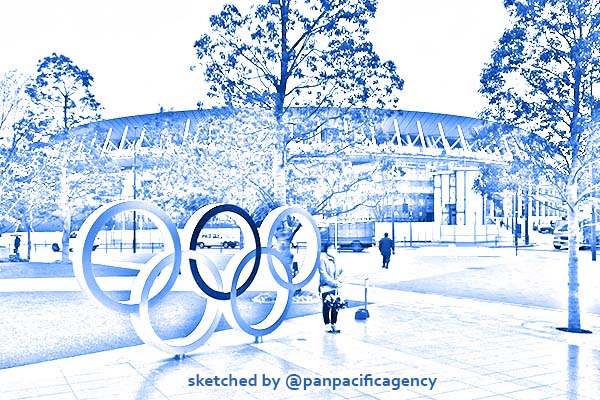Organizers plan to hold 2020 Olympics with spectators next summer

A woman pauses for photos next to the Olympic rings near the New National Stadium in Tokyo, Monday, March 23, 2020. The IOC will take up to four weeks to consider postponing the Tokyo Olympics amid mounting criticism of its handling of the coronavirus crisis that now includes a call for delay from the leader of track and field, the biggest sport at the games. (AP Photo/Jae C. Hong). Sketched by the Pan Pacific Agency.
TOKYO, Nov 16, 2020, The Japan Times. Organizers are moving forward in lockstep with plans to host the postponed Tokyo 2020 Olympic and Paralympic Games next summer with spectators, International Olympic Committee President Thomas Bach said on Monday following a meeting with Prime Minister Yoshihide Suga, The Japan Times reported.
Neither Bach nor Suga specified how many spectators will be allowed to attend Olympic and Paralympic sporting events, and the announcement came as Japan continues to grapple with what appears to be a third wave of coronavirus infections spurred by a nationwide surge that began in late October.
“Now we are all in during this coronavirus crisis,” Bach told reporters at the Prime Minister’s Office.
“We are putting a really huge toolbox together in which we will put all the different measures we can imagine,” he said. “So that next year, at the appropriate time, we will be able to take the right tools out of this toolbox and apply them in order to ensure a safe environment for all participants in the games.”
While fears remain that COVID-19 won’t be under control by July 2021 — and that hosting the global sporting event during an ongoing pandemic would only exacerbate the situation — organizers are presenting an optimistic veneer, insisting the games will be the “light at the end of the tunnel” and symbolize the resilience of humankind.
Bach met with Suga and Tokyo Gov. Yuriko Koike before kicking off a three-day project review meeting with the IOC and the International Paralympic Committee.
“We are firmly committed to hosting the Tokyo Games next year,” Suga told reporters on Monday. “The tournament will serve as a signal to the world that humanity has conquered the virus, and that Japan has begun to recover from the March 2011 Great East Japan Earthquake.”
Plans are moving forward under the premise that spectators will be able to attend 2020 sporting events, Suga said.
While 2020 organizers have said the games will be held at all costs, it’s impossible to predict what condition the coronavirus outbreak will be in Japan eight months from now, much less what the rest of the world will look like. Though Suga has promised that all Japanese citizens will receive a vaccine free of charge during the first half of next year, a vaccine has yet to be produced, though encouraging signs are beginning to emerge. In addition, the Olympic and Paralympic Games attract travelers from all corners of the globe, all of whom would also need to be vaccinated.
In loosening border restrictions, the central government is prioritizing athletes looking to compete in the 2020 Games, as well as spectators from abroad hoping to attend.
Athletes will be exempted from entry restrictions, though they will still have to test negative for COVID-19, and will be asked to monitor their health for 72 hours before leaving their own country. Upon arrival, they will be tested again and have their movements monitored during their stay.
Officials are reportedly moving forward with plans to enforce similar restrictions on travelers from abroad looking to attend the games.
“We are making all possible efforts to ensure the safety of athletes planning to compete in the games and travelers looking to attend them,” Koike told Bach during a meeting at the Tokyo Metropolitan Government.
Bach said he assumes a vaccine will be available by next summer, and that most travelers from abroad — “as many as possible” — will be vaccinated, tested and screened before entering Japan.
In early October, the Tokyo 2020 Organising Committee announced that room had been found to reduce the total budget of ¥1.35 trillion by ¥30 billion — or roughly 2% — under a “simplified” plan for the games that, among 52 total revisions, includes fewer spectators, shortened employment terms for organizing committee staff and fewer decorations at competition venues.
The ¥30 billion reduction, however, is a fraction of the additional cost unleashed by the one-year deferral, which organizers estimate could exceed ¥300 billion and push the total budget past ¥1.6 trillion.